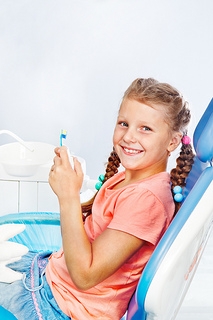“Witch” Halloween Treats Are Trickiest for Your Teeth?
October 25th, 2023

It’s that time of year again—Halloween! Carving pumpkins. Creating costumes. And, of course, collecting candy.
But some of the candies in that collection aren’t much of a treat for your teeth. When you’re deciding on the perfect pieces to choose from the candy cauldron, here are some tricks from Dental Land Pediatrics to identify the ones that can be more frightful than delightful for your tooth enamel:
- Is it Chewy or Sticky?
Any sticky or chewy candy—caramels, taffy, licorice, gummy anything—is candy that also sticks to your teeth. And it really sticks in between your teeth, where it’s harder to brush away.
The problem? Bacteria in plaque love sugar, and sticky candies provide them with hours of sugary feasting. Bacteria use this sugar to make acids, and acids cause weak spots in tooth enamel. These weak spots will get bigger over time as the bacteria keep on attacking your enamel, and that’s how you can end up with a cavity. Less sugar that spends less time on your teeth = fewer cavities!
- Is it Sour?
Sour candies get that intense, lip-puckering taste because they’re so acidic. What’s wrong with acids? Just like the acids made by bacteria, acids in food attack our tooth enamel, too.
Sour candies are hard on your teeth all by themselves. When you eat a candy that’s both sour (acidic) and gummy (sticky), all coated in sugar, that’s triple trouble!
- Is it Hard or Crunchy?
Some kids like hard candies like lollipops and fruity drops because they last a long time. But that’s the problem. All that time a hard candy rolls around in your mouth is time spent bathing your teeth with sugar.
Thinking of shortening your sugar exposure by chewing hard candies? Also a bad idea! Crunching into a piece of hard candy can chip or crack a tooth and even damage fillings.
Luckily, there are healthier trick-or-treating choices if you know what to look for.
- Soft Candies and Chocolates
A chocolate bar, a peanut butter cup, mint patties, and other soft candies won’t stick around on your teeth the same way chewy or hard candies do. No sour acids, either. And because dark chocolate has less sugar than lighter chocolates, it’s an even healthier choice.
- Sugar-Free Gum
This treat is not only sugarless, but chewing it helps us make more saliva. Saliva washes away sugary food particles and helps lower the amount of acids in the mouth. You can get the same results with sugar-free lollipops or hard candies—just don’t crunch down on them.
No need to skip the trick-or-treating this year. Occasional sugary or acidic treats can be balanced out with daily brushing and flossing, a healthy diet, and regular visits to our Bowie office for exams and cleanings. When you do enjoy a treat that’s sugary or acidic, there are tricks to help you keep your smile healthy and cavity-free.
- Eat a treat or two with your meals instead of snacking through the day. You won’t be exposing your teeth to sugar for hours at a time, which means bacteria and acids won’t be haunting your enamel all day long.
- Drink water. If you eat your candy with an acidic soda or juice, you’re getting sugar + sugar + acids. That’s a scary recipe when it comes to healthy teeth! Water helps wash away sugar and acids—and, if you have fluoridated water in your community, you’ll be getting a bit of fluoride to strengthen your enamel, too.
- Halloween is no time to ghost your toothbrush and floss. Be extra careful to brush and clean between your teeth after eating sweets.
Any questions? Talk to Dr. Dinah Abioro to learn the best ways to keep your smile looking boo-tiful all year long!








